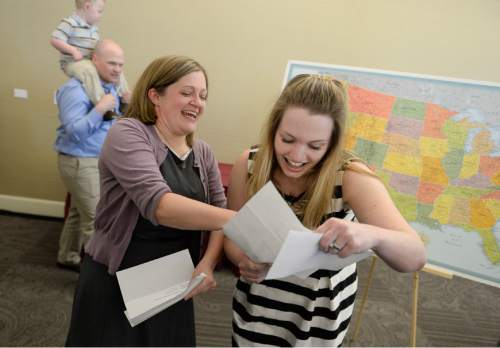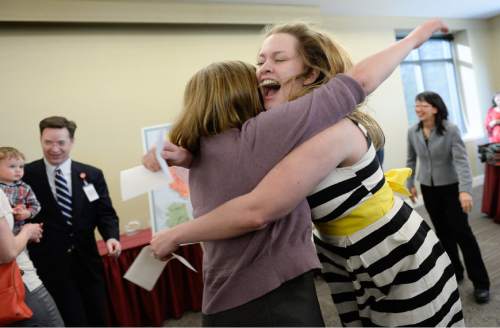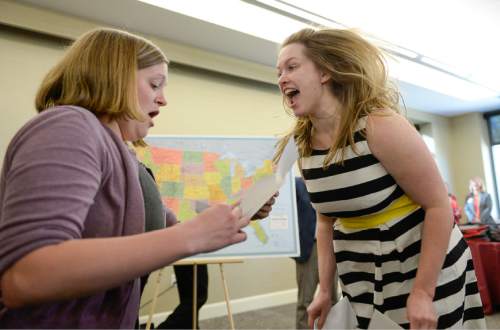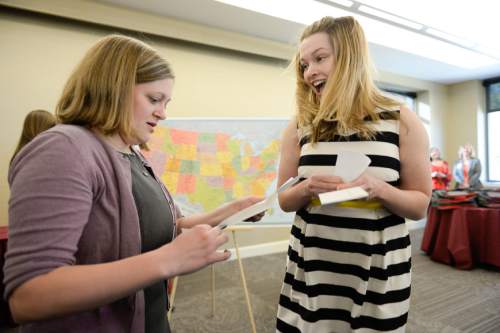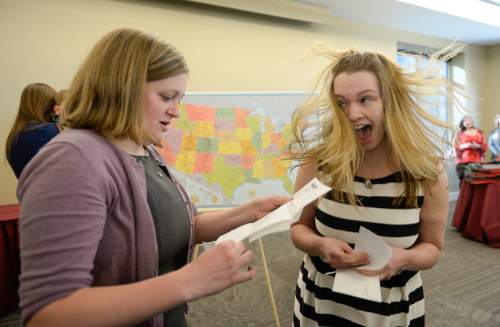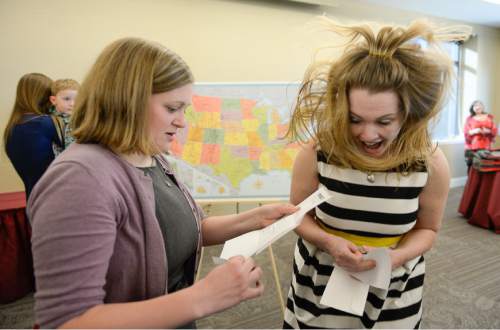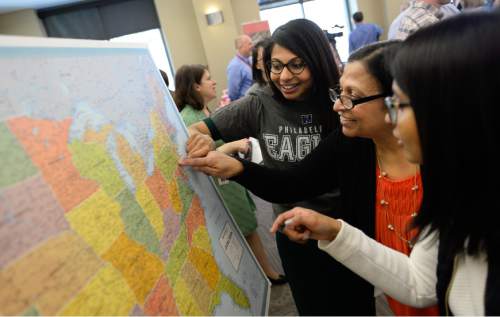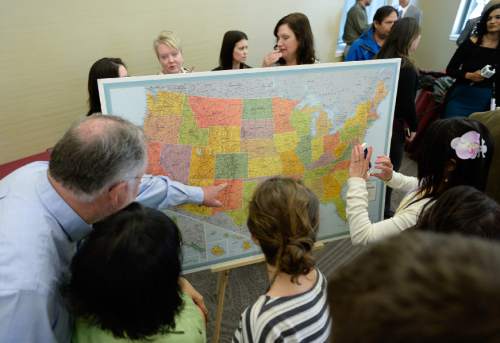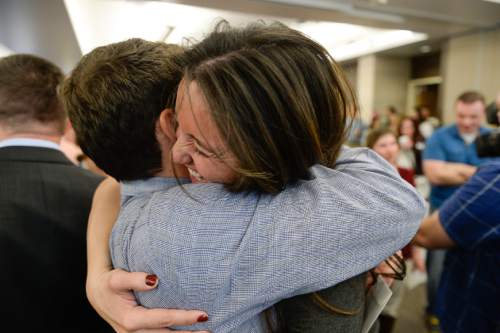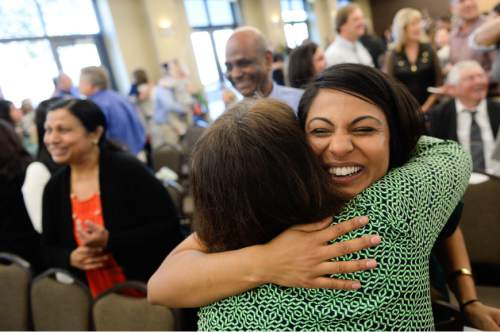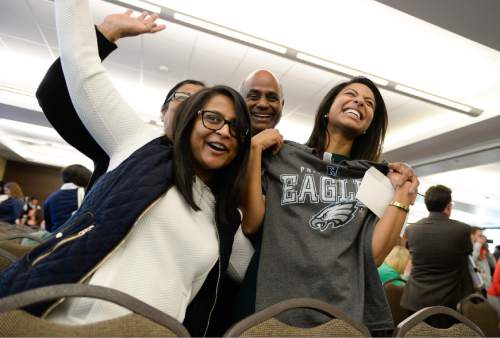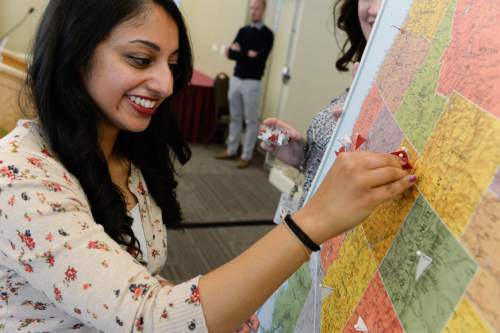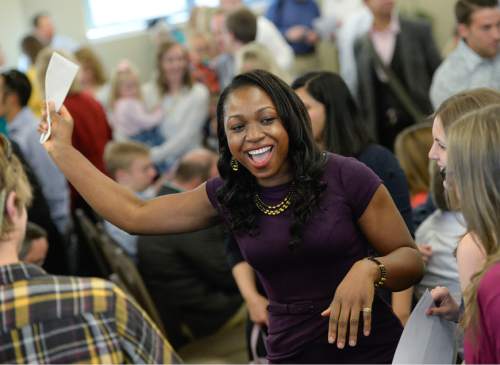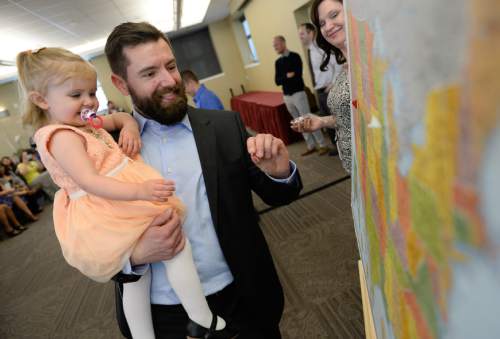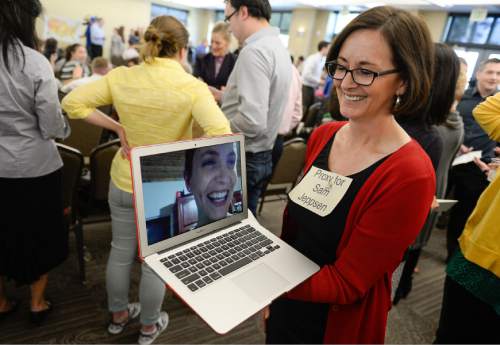This is an archived article that was published on sltrib.com in 2015, and information in the article may be outdated. It is provided only for personal research purposes and may not be reprinted.
Amalia Winters' scream was the loudest and highest-pitched sent across the room at the University of Utah's "Match Day" event Friday, when she learned she is one of 25 medical students in the country accepted for prestigious cardiothoracic surgery training.
Winters and her 73 classmates at the U.'s medical school — along with graduating students nationwide — ripped open long-awaited envelopes to learn where they will spend the next chapter of their medical careers. The 30 women and 44 men were matched to residencies in 23 specialties at sites in 27 states.
Thirty-six percent — 27 students — will enter residences in internal medicine, pediatrics, obstetrics/gynecology and family medicine, a trend closely watched amid a national shortage of primary care doctors.
"I can see that today you are filled with both excitement and anxiety," said Vivian Lee, dean of the U.'s School of Medicine. "Soon you will be able to prescribe for both of those conditions, but until then, take my advice: It is not the residency that makes the physician; it is the physician that makes the residency."
In a first for the U., Winters will enter the cardiac surgery program at Emory University without undergoing the typical five-year training in general surgery beforehand. Emory has only two spots in that program and is one of the top schools in the nation.
"It's very rare," said Amit Patel, a U. professor and a cardiac surgeon at University Hospital. "You have to be incredibly bright and gifted to be accepted into that program."
Winters volunteered in the cardiac operating room in her spare time during her last three years of medical school, and Patel said she assists firsthand in surgery more than most first-year residents do.
"It's one thing to be book smart, but in cardiac surgery, you need both book and people smarts," Patel said.
Winters said she always planned to be a doctor, but "I didn't know I wanted to be a heart surgeon until I saw a heart."
She and her husband, Sterling Winters, plan to move to Atlanta this summer to begin her program.
"I'm so excited," Winters said.
For most, Match Day was a family affair.
Ali Taylor, who matched at the U. in emergency medicine, said her brother Ben was arguably more excited than she was, even though the U. was her top choice.
"I told him I probably wasn't going to stay here because Utah is so competitive, but I was super excited," Taylor said.
The siblings, born four years apart, are close skiing buddies and hang out all the time, Ben Taylor said.
"I was planning on her going somewhere else, so when she said she was staying, she was probably surprised by my reaction," he said. "My siblings are my best friends."
With their youngest brother returning from a mission for the LDS Church this summer and Taylor staying in Salt Lake City for her residency, all but one of the five Taylor children will be together.
It also was a tender moment for Magdalena and Mike Cline, who found out Mike matched at the University of California, Los Angeles, just eight weeks after their son Marcus was born.
"We're just overwhelmed," Magdalena Cline said.
Student Samantha Jeppsen attended remotely via Skype on her mother's laptop. Jeppsen is doing a global health rotation in Rwanda and matched at University of California, Davis, in Sacramento in an emergency medicine program.
Dean Tanner and Jackie Simonis, who began dating in their first year of medical school, both matched at Carolinas Medical Center in Charlotte, N.C., in emergency medicine.
"It's bittersweet to leave Utah but we're excited to go get a job," Simonis said.
"We're excited to do it together," Tanner said. "Now we're going to go skiing for our last winter for years."
Matching University of Utah medical students
Amid budget cuts, the University of Utah cut the size of its medical school class by 20 slots. The class of 2017 was the first to return to 100 slots.
2015 • 74 students matched to residencies; 30 women and 44 men, with 27 in primary care.
2014 • 77 students matched; 23 women and 54 men, with 29 in primary care.
2013 • 73 students matched; 21 women and 52 men, with 26 in primary care.
2012 • 97 students matched; 35 women and 62 men, with 37 in primary care.


